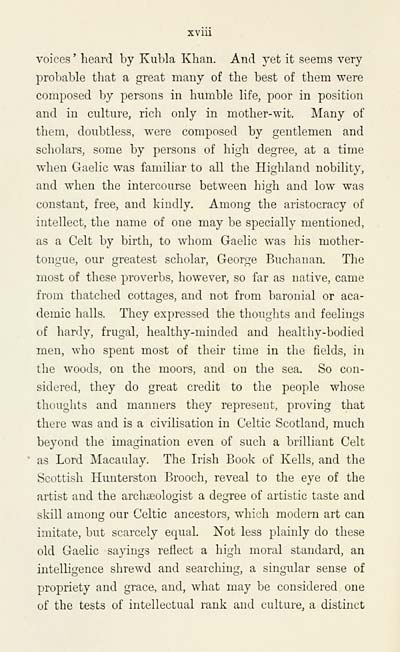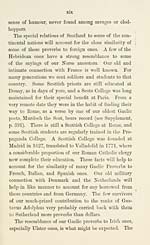Download files
Complete book:
Individual page:
Thumbnail gallery: Grid view | List view

voices ' heard by Kubla Klian. And yet it seems very
probable that a great many of the best of them were
composed by persons in humble life, poor in position
and in culture, rich only in mother-wit. Many of
them, doubtless, were composed by gentlemen and
scholars, some by persons of high degree, at a time
when Gaelic was familiar to all the Highland nobility,
and when the intercourse between high and low was
constant, free, and kindly. Among the aristocracy of
intellect, the name of one may be specially mentioned,
as a Celt by birth, to whom Gaelic was his mother-
tongue, our greatest scholar, George Buchanan. The
most of these proverbs, however, so far as native, came
from tliatched cottages, and not from baronial or aca-
demic halls. They expressed the thoughts and feelings
of hardy, frugal, healthy-minded and healthy-bodied
men, who spent most of their time in the fields, in
the woods, on the moors, and on the sea. So con-
sidered, they do great credit to the people whose
thoughts and manners they represent, proving that
there was and is a civilisation in Celtic Scotland, much
beyond the imagination even of such a brilliant Celt
as Lord Macaulay. The Irish Book of Kells, and the
Scottish Hunterston Brooch, reveal to the eye of the
artist and the archaeologist a degree of artistic taste and
skill among our Celtic ancestors, which modern art can
imitate, but scarcely equal. Not less plainly do these
old Gaelic sayings reflect a high moral standard, an
intelligence shrewd and searching, a singular sense of
propriety and grace, and, what may be considered one
of the tests of intellectual rank and culture, a distinct
probable that a great many of the best of them were
composed by persons in humble life, poor in position
and in culture, rich only in mother-wit. Many of
them, doubtless, were composed by gentlemen and
scholars, some by persons of high degree, at a time
when Gaelic was familiar to all the Highland nobility,
and when the intercourse between high and low was
constant, free, and kindly. Among the aristocracy of
intellect, the name of one may be specially mentioned,
as a Celt by birth, to whom Gaelic was his mother-
tongue, our greatest scholar, George Buchanan. The
most of these proverbs, however, so far as native, came
from tliatched cottages, and not from baronial or aca-
demic halls. They expressed the thoughts and feelings
of hardy, frugal, healthy-minded and healthy-bodied
men, who spent most of their time in the fields, in
the woods, on the moors, and on the sea. So con-
sidered, they do great credit to the people whose
thoughts and manners they represent, proving that
there was and is a civilisation in Celtic Scotland, much
beyond the imagination even of such a brilliant Celt
as Lord Macaulay. The Irish Book of Kells, and the
Scottish Hunterston Brooch, reveal to the eye of the
artist and the archaeologist a degree of artistic taste and
skill among our Celtic ancestors, which modern art can
imitate, but scarcely equal. Not less plainly do these
old Gaelic sayings reflect a high moral standard, an
intelligence shrewd and searching, a singular sense of
propriety and grace, and, what may be considered one
of the tests of intellectual rank and culture, a distinct
Set display mode to: Large image | Transcription
Images and transcriptions on this page, including medium image downloads, may be used under the Creative Commons Attribution 4.0 International Licence unless otherwise stated. ![]()
| Early Gaelic Book Collections > Blair Collection > Collection of Gaelic proverbs and familiar phrases > (22) |
|---|
| Permanent URL | https://digital.nls.uk/76277532 |
|---|
| Description | A selection of books from a collection of more than 500 titles, mostly on religious and literary topics. Also includes some material dealing with other Celtic languages and societies. Collection created towards the end of the 19th century by Lady Evelyn Stewart Murray. |
|---|
| Description | Selected items from five 'Special and Named Printed Collections'. Includes books in Gaelic and other Celtic languages, works about the Gaels, their languages, literature, culture and history. |
|---|

